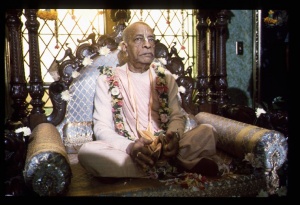SB 3.12.35: Difference between revisions
m (1 revision(s)) |
No edit summary |
||
| Line 1: | Line 1: | ||
{{info | {{info | ||
|speaker=Maitreya | |speaker=Maitreya Ṛṣi | ||
|listener=Vidura | |listener=Vidura | ||
}} | }} | ||
[[Category:Srimad-Bhagavatam - Canto 03 Chapter 12]] | |||
[[Category:Bhagavatam Verses Spoken by Maitreya Rsi - Vanisource|031235]] | |||
<div style="float:left">'''[[Srimad-Bhagavatam]] - [[SB 3|Third Canto]] - [[SB 3.12: Creation of the Kumaras and Others|Chapter 12: Creation of the Kumāras and Others]]'''</div> | |||
<div style="float:right">[[File:Go-previous.png|link=SB 3.12.34]] '''[[SB 3.12.34]] - [[SB 3.12.36]]''' [[File:Go-next.png|link=SB 3.12.36]]</div> | |||
{{RandomImage}} | |||
==== TEXT 35 ==== | ==== TEXT 35 ==== | ||
<div | <div class="verse"> | ||
cātur-hotraṁ karma-tantram | :cātur-hotraṁ karma-tantram | ||
upaveda-nayaiḥ saha | :upaveda-nayaiḥ saha | ||
dharmasya pādāś catvāras | :dharmasya pādāś catvāras | ||
tathaivāśrama-vṛttayaḥ | :tathaivāśrama-vṛttayaḥ | ||
</div> | </div> | ||
| Line 16: | Line 22: | ||
==== SYNONYMS ==== | ==== SYNONYMS ==== | ||
<div | <div class="synonyms"> | ||
''cātuḥ''—four; ''hotram''—paraphernalia for sacrifice; ''karma''—action; ''tantram''—expansions of such activities; ''upaveda''—supplementary to the ''Vedas''; ''nayaiḥ''—by logical conclusions; ''saha''—along with; ''dharmasya''—of religiosity; ''pādāḥ''—principles; ''catvāraḥ''—four; ''tathā eva''—in the same way; ''āśrama''—social orders; ''vṛttayaḥ''—occupations. | |||
</div> | </div> | ||
| Line 23: | Line 29: | ||
==== TRANSLATION ==== | ==== TRANSLATION ==== | ||
<div | <div class="translation"> | ||
The four kinds of paraphernalia for conducting the fire sacrifice became manifest: the performer [the chanter], the offerer, the fire, and the action performed in terms of the supplementary Vedas. Also the four principles of religiosity [truth, austerity, mercy and cleanliness] and the duties in the four social orders all became manifest. | The four kinds of paraphernalia for conducting the fire sacrifice became manifest: the performer [the chanter], the offerer, the fire, and the action performed in terms of the supplementary Vedas. Also the four principles of religiosity [truth, austerity, mercy and cleanliness] and the duties in the four social orders all became manifest. | ||
</div> | </div> | ||
| Line 30: | Line 36: | ||
==== PURPORT ==== | ==== PURPORT ==== | ||
<div | <div class="purport"> | ||
Eating, sleeping, defending and mating are the four principles of material bodily demands which are common to both the animals and human society. To distinguish human society from the animals there is the performance of religious activities in terms of the social statuses and orders of life. They are all clearly mentioned in the Vedic literatures and were manifested by Brahmā when the four Vedas were generated from his four mouths. Thus the duties of humankind in terms of the statuses and social orders were established to be observed by the civilized man. Those who traditionally follow these principles are called Āryans, or progressive human beings. | Eating, sleeping, defending and mating are the four principles of material bodily demands which are common to both the animals and human society. To distinguish human society from the animals there is the performance of religious activities in terms of the social statuses and orders of life. They are all clearly mentioned in the Vedic literatures and were manifested by Brahmā when the four ''Vedas'' were generated from his four mouths. Thus the duties of humankind in terms of the statuses and social orders were established to be observed by the civilized man. Those who traditionally follow these principles are called Āryans, or progressive human beings. | ||
</div> | </div> | ||
__NOTOC__ | |||
<div style="float:right; clear:both;">[[File:Go-previous.png|link=SB 3.12.34]] '''[[SB 3.12.34]] - [[SB 3.12.36]]''' [[File:Go-next.png|link=SB 3.12.36]]</div> | |||
__NOTOC__ | |||
__NOEDITSECTION__ | |||
Revision as of 10:10, 5 May 2021

A.C. Bhaktivedanta Swami Prabhupada
TEXT 35
- cātur-hotraṁ karma-tantram
- upaveda-nayaiḥ saha
- dharmasya pādāś catvāras
- tathaivāśrama-vṛttayaḥ
SYNONYMS
cātuḥ—four; hotram—paraphernalia for sacrifice; karma—action; tantram—expansions of such activities; upaveda—supplementary to the Vedas; nayaiḥ—by logical conclusions; saha—along with; dharmasya—of religiosity; pādāḥ—principles; catvāraḥ—four; tathā eva—in the same way; āśrama—social orders; vṛttayaḥ—occupations.
TRANSLATION
The four kinds of paraphernalia for conducting the fire sacrifice became manifest: the performer [the chanter], the offerer, the fire, and the action performed in terms of the supplementary Vedas. Also the four principles of religiosity [truth, austerity, mercy and cleanliness] and the duties in the four social orders all became manifest.
PURPORT
Eating, sleeping, defending and mating are the four principles of material bodily demands which are common to both the animals and human society. To distinguish human society from the animals there is the performance of religious activities in terms of the social statuses and orders of life. They are all clearly mentioned in the Vedic literatures and were manifested by Brahmā when the four Vedas were generated from his four mouths. Thus the duties of humankind in terms of the statuses and social orders were established to be observed by the civilized man. Those who traditionally follow these principles are called Āryans, or progressive human beings.